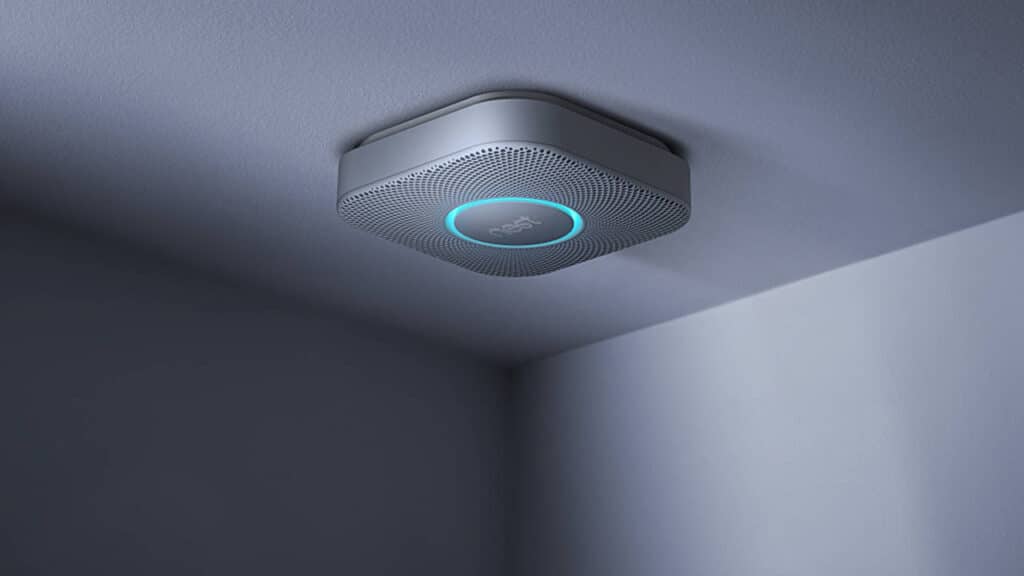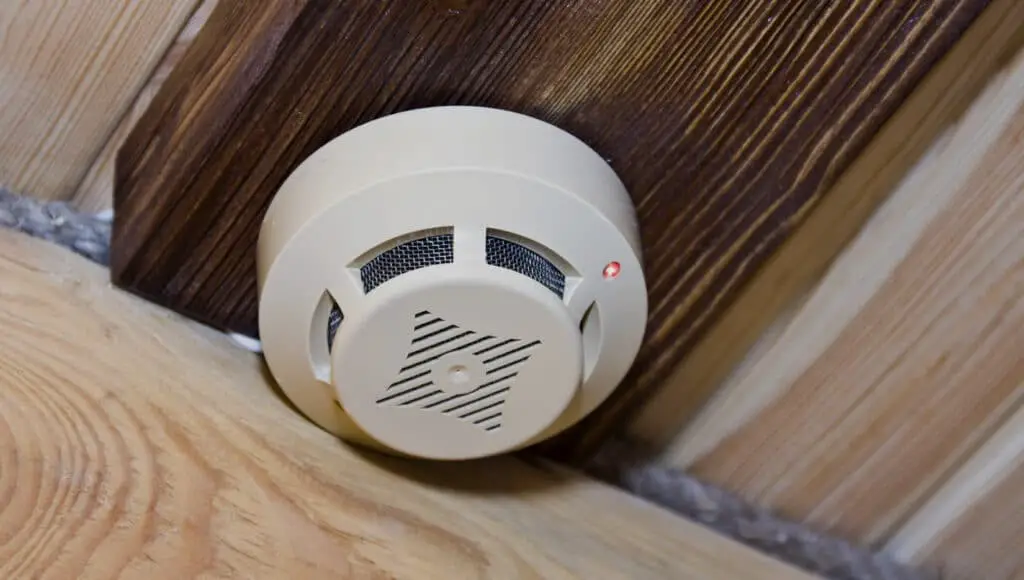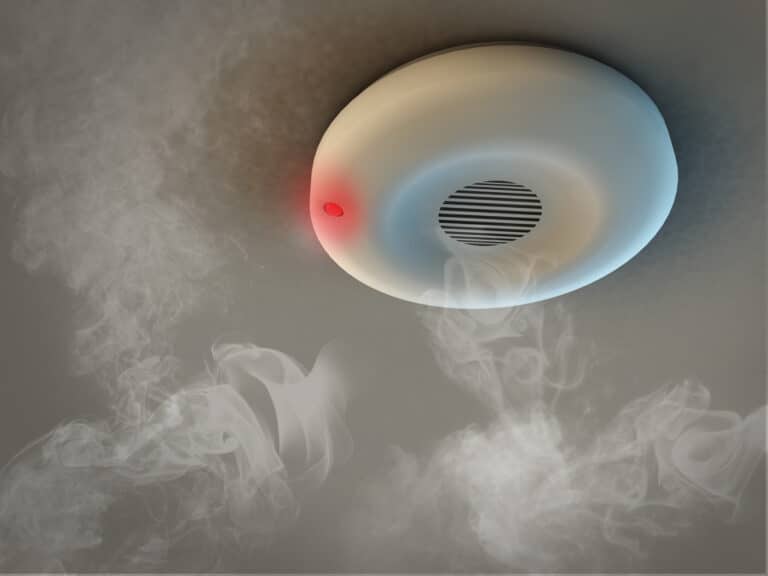Introduction
How To Dispose Of Smoke Detectors: Smoke detectors are an essential safety feature in every home or building. These devices detect smoke and warn inhabitants of imminent fires, giving them time to flee and ask for help. Smoke detectors age like other electronics and must be replaced. Properly disposing of an obsolete smoke detector protects people and the environment.
Proper disposal of smoke detectors is crucial because they contain radioactive materials. Most smoke detectors use a small amount of a radioactive isotope called Americium-241 to detect smoke particles. While the amount of Americium-241 in a smoke detector is very small and poses no immediate danger to humans, it can still be harmful if not handled and disposed of correctly. The radioactive blinking red material can contaminate the environment if it is not properly contained and disposed of, potentially causing harm to wildlife and ecosystems.
Contacting the manufacturer or store about smoke detector disposal is one possibility. Smoke detector recycling programs are offered by several manufacturers and merchants. They may provide instructions on how to carefully package and transport the detector back to them or have drop-off locations for disposal. This is usually the easiest and most convenient way to handle and dispose of the smoke detector. If you can’t find a manufacturer or store program, contact your local trash disposal facility. Waste management facilities may accept smoke detectors, but others have disposal requirements. Know your local facility’s smoke detector disposal policies before disposing of them. They may require you to package or drop off the detector.

How do I get rid of a smoke alarm?
Getting rid of a smoke alarm may seem like a simple task, but it is important to do it properly to ensure the safety of your home. Whether you are replacing an old smoke alarm or no longer need one in a specific area, there are a few steps you should follow to properly dispose of it. In this article, we will discuss the proper way to get rid of a smoke alarm.
Step 1: Remove the smoke alarm
The first step in getting rid of a smoke alarm is to remove it from its mounting bracket. Most smoke alarms are attached to the ceiling or wall with screws or adhesive. Carefully unscrew the smoke alarm from the bracket or gently pry it off the wall. Be sure to turn off the power to the smoke alarm before attempting to remove it to avoid any electrical shocks.
Step 2: Check the type of smoke alarm
Before disposing of the smoke alarm, it is important to check the type of alarm you have. There are two main types of smoke alarms: ionization and photoelectric. Despite their tiny radioactivity, ionization smoke alarms should not be thrown away. You may throw away photoelectric smoke alarms since they contain no dangerous components.
Step 3: Dispose of the smoke alarm
If you have an ionization smoke alarm, you will need to dispose of it properly. Contact your local waste management facility or fire department to find out the proper way to dispose of radioactive materials in your area. They may have specific guidelines or collection events for hazardous waste disposal. Follow their instructions to safely dispose of the smoke alarm.
How do you dispose of a 10 year smoke detector?
Disposing of a 10-year smoke detector requires careful consideration due to the presence of radioactive materials. Smoke detectors are essential safety devices that help protect us from the dangers of fire. Dispose of them appropriately after 10 years for environmental and personal safety. In this article, we will discuss the proper methods of disposing of a 10-year smoke detector.
Firstly, it is important to understand that most 10-year smoke detectors contain a small amount of radioactive material called Americium-241. This material is used to detect smoke particles in the air. While the amount of Americium-241 in a smoke detector is relatively small and poses no immediate danger, it is still important to handle and dispose of it properly.
One option for disposing of a 10-year smoke detector is to contact the manufacturer or the local waste management authority. Many manufacturers have specific instructions for the proper disposal of their products, including smoke detectors. They may provide guidance on how to safely remove the radioactive material or direct you to a local facility that can handle the disposal.
If contacting the manufacturer is not an option, you can also check with your local waste management authority. They may have specific guidelines or programs in place for the disposal of hazardous materials, including smoke detectors. They can provide you with information on drop-off locations or scheduled collection events for these types of items.
Another option is to check if there are any recycling programs available in your area. Some recycling centers or facilities may accept smoke detectors for proper disposal. These programs safely handle and dispose of radioactive waste, reducing environmental damage.
How do I dispose of a smoke detector near me?
Disposing of a smoke detector properly is important to ensure the safety of both the environment and individuals. Smoke detectors contain small amounts of radioactive material, making it necessary to handle their disposal with care. If you are wondering how to dispose of a smoke detector near you, there are a few steps you can follow to ensure proper disposal.
Check the manufacturer’s instructions for your smoke detector model first. Manufacturer disposal instructions may involve mailing the detector back or delivering it to a collection site. To dispose properly and accordance with manufacturer rules, follow these guidelines.
If the manufacturer does not give instructions, contact your local trash management or recycling center. They can advise on local smoke detector disposal. They may dispose of electronic garbage, including smoke detectors, according to prescribed protocols.
Smoke detectors should not be thrown away. They contain trace amounts of radioactive material, usually Americium-241, which can be dangerous if not properly disposed of. Contact your local trash management center to dispose of the smoke detector safely and sustainably.
Electronic waste collection events or programs may be available in your area. Local governments or environmental groups conduct these events to safely and conveniently dispose of smoke alarms. Watch for local pickup events or contact your garbage management facility.
Why do smoke detectors have radioactive material?
Consumers should be aware that ionization smoke detectors contain a small amount of the man-made radioactive material Americium-241. When smoke enters the ionization chamber of this type of smoke alarm, it disrupts the flow of particles coming from the radioactive material, thus triggering the alarm.
Smoke detectors are vital in homes, offices, and public spaces. They are essential for warning residents of smoke and fire threats. It is paradoxical to have radioactive material in smoke detectors, which are supposed to protect us.
You should know that not all smoke detectors contain radioactive material. Two basic types of smoke detectors are ionization and photoelectric. Photoelectric smoke detectors contain no radioactive substance, while ionization smoke detectors use americium-241.
Ionization smoke detectors use a little amount of alpha particle emitter americium-241. This radioactive substance is in a smoke detector chamber. The alarm sounds when smoke blocks ion flow between two charged plates in the chamber. Alpha particles from americium-241 ionize chamber air, causing a tiny electrical current. The smoke detector activates the alarm when smoke particles disturb this current.
Smoke detectors contain very little radioactive material, which poses no health risks. The smoke detector seals prevent normal access to the radioactive substances. The half-life of americium-241 is short, hence its radioactivity diminishes over time.
Why do smoke detectors expire?
Home and building smoke detectors are critical safety devices worldwide. These devices detect smoke and warn inhabitants of fire hazard. However, many people may not be aware that smoke detectors have an expiration date. This expiration date is not arbitrary; it is based on the lifespan of the device’s components and the need for regular maintenance and testing.
The limited lifespan of smoke detector components contributes to their failure. Battery or building electricity powers smoke alarms. Smoke detector batteries may fail, rendering the gadget useless. Electrical deterioration can also cause hardwired smoke detector failure. To maintain reliability, smoke detectors should be replaced before their parts wear out.
Routine testing and maintenance expire smoke detectors. Regularly examine smoke detectors to preserve functionality. Activate the alarm and check its volume with the test button. Clean smoke detectors regularly to remove dust and debris that could impact operation. Testing and cleaning might degrade smoke detectors. By changing smoke detectors regularly, homeowners and building owners can ensure their effectiveness.
Smoke detectors may expire due to technology and safety. Advances in technology improve smoke detector performance. Modern variants have improved sensors or can connect to a home’s smart system for remote monitoring. Upgrade to new smoke detectors to take advantage of these advances and ensure the latest safety precautions.
Proper smoke detector disposal ensures safety and environmental responsibility. Remove smoke detector batteries first. We must prevent accidental activation or leakage of hazardous goods during disposal. Following battery removal, consult the manufacturer’s or product label for disposal instructions.
Manufacturers or local waste management organizations usually provide smoke detector disposal instructions. They may direct you to recycling or collection sites. Poorly discarded smoke detectors might contain toxic materials that harm the environment.
Are there any specific regulations or guidelines for disposing of smoke detectors?
Yes, there are specific regulations and guidelines for disposing of smoke detectors. The proper steps for disposing of smoke detectors may vary depending on your location, so it is important to check with your local authorities or waste management facilities for specific instructions. In general, it is recommended to follow these guidelines:
1. Remove the batteries: Before disposing of a smoke detector, it is crucial to remove the batteries. This is important to prevent any potential hazards during the disposal process.
2. Check for recycling options: Many smoke detectors contain recyclable plastic and metal. Check with your local recycling facilities to see if they accept smoke detectors for recycling. If they do, follow their instructions for proper recycling.
3. Contact the manufacturer: Some smoke detector manufacturers have specific guidelines for disposing of their products. Contact the manufacturer or visit their website to find out whether they have recycling instructions or programs.
4. Dispose of in accordance with local regulations: If recycling options are not available, it is important to dispose of smoke detectors in accordance with local regulations. This may involve placing them in the regular trash or taking them to designated hazardous waste collection sites.
By following these regulations and guidelines, you can ensure that smoke detectors are disposed of properly and in an environmentally responsible manner.
Can smoke detectors be recycled? How?
Smoke detectors are recyclable. Note that not all smoke detector parts can be recycled. Plastic casings are the principal recyclable smoke detector parts. To recycle a smoke detector, you should first remove the batteries and any other non-recyclable components. Then, you can take the plastic casing to a recycling center that accepts electronic waste. It is important to check with your local recycling center to ensure they accept smoke detectors for recycling.
Handle smoke detector recycling carefully. Smoke detectors use small amounts of radioactive material, mainly Americium-241. The detector encapsulates this radioactive material, making it harmless. If the detector breaks, dispose of radioactive material properly. Ask your local environmental agency or hazardous waste disposal center how to safely dispose of a damaged smoke detector.
Any dangerous materials in smoke detectors that necessitate careful disposal?
Some smoke detector parts are hazardous and must be disposed of properly. Most smoke detectors use a small amount of radioactive Americium-241 to detect airborne smoke. The detector contains this radioactive material, making it harmless. Avoid radioactive emission by properly disposing of smoke detectors.
Contact your local trash management or recycling center for smoke detector disposal instructions. They may have specific instructions on how to safely handle and dispose of smoke detectors containing radioactive material. It is important to follow their guidelines to ensure the safe and proper disposal of these hazardous materials.
Are there any alternative methods for disposing of smoke detectors that are more environmentally friendly?
Yes, there are alternative methods for disposing of smoke detectors that are more environmentally friendly. One option is to check with the manufacturer of the smoke detector to see if they have a take-back program. Some manufacturers have programs in place where they will accept old smoke detectors for proper disposal or recycling. This ensures that the detectors are handled in an environmentally responsible manner.
Another alternative method is to contact your local recycling center or hazardous waste facility. They may have specific guidelines for disposing of smoke detectors, as they often contain small amounts of radioactive material. These facilities can provide instructions on how to safely dispose of the detectors and may even have designated drop-off locations for them.

Conclusion
One of the most common methods of disposing of smoke detectors is through recycling programs. Many manufacturers offer take-back programs where they accept old smoke detectors for proper disposal. These initiatives carefully manage and dispose of radioactive materials, reducing environmental contamination.
Another option for disposing of smoke detectors is through hazardous waste collection centers. These centers are equipped to handle and dispose of various hazardous materials, including smoke detectors. It is important to contact the local waste management facility or check their website for information on how to properly dispose of smoke detectors in your area.
It is crucial to never throw smoke detectors in the regular trash or recycling bins. This can lead to the release of radioactive materials into the environment, posing a risk to both humans and wildlife. Avoid burning smoke detectors as well.
Proper disposal of smoke detectors is essential for the safety of the environment and individuals. We may securely dispose of smoke detector radioactive materials by recycling or using hazardous waste collection sites It is our responsibility to protect the environment and prevent any potential harm that may arise from improper disposal of smoke detectors.

